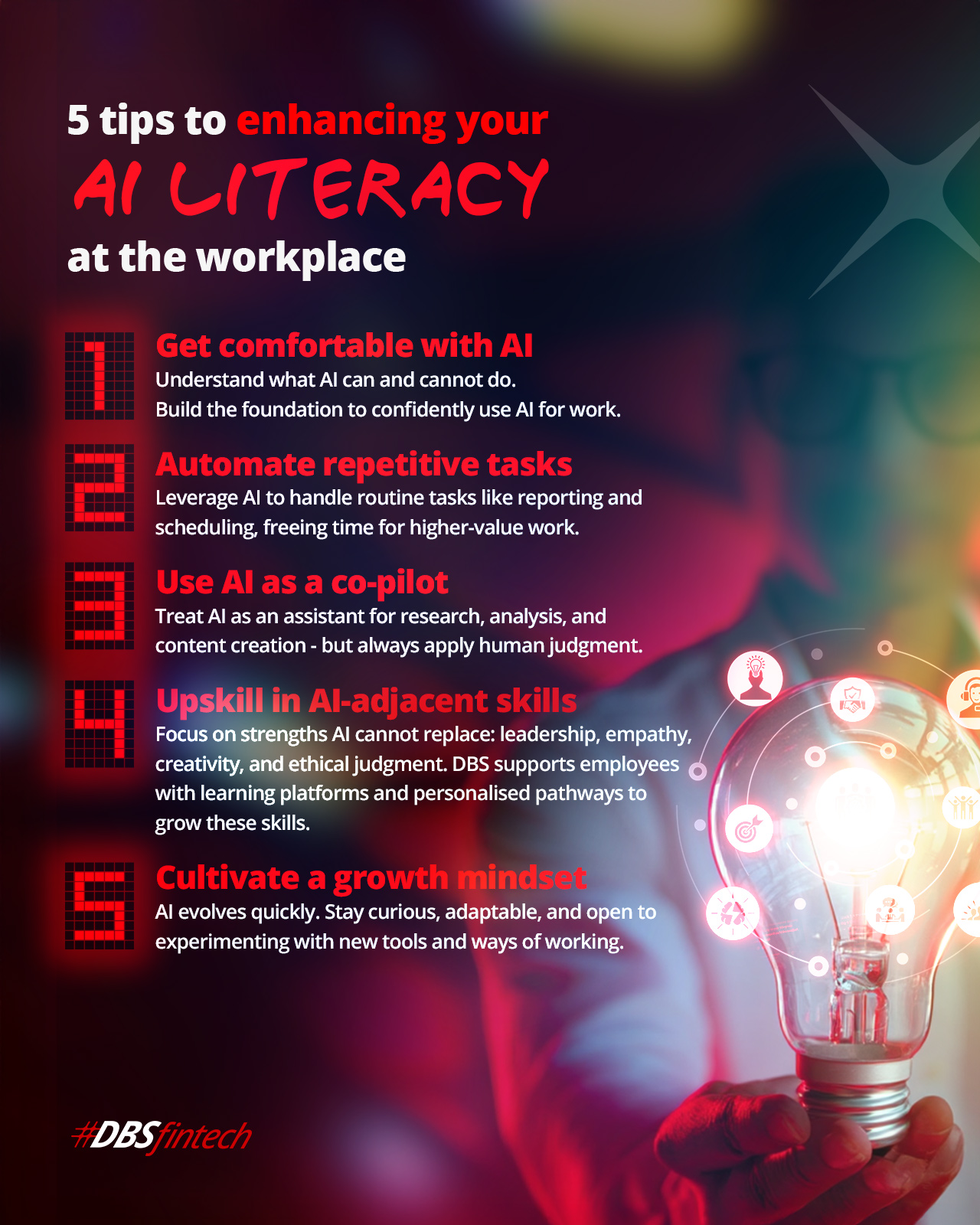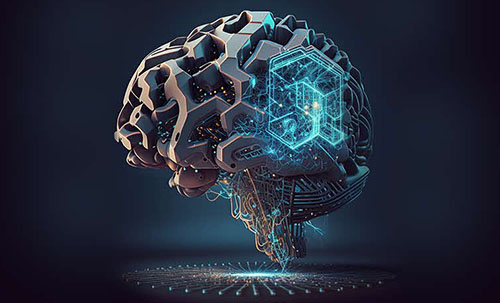Evolving from digital to AI literacy, unlocking new superpowers in the workplace

AI is redefining how we learn and apply knowledge, making AI literacy essential for navigating and thriving in the modern workplace.
10 November 2025
These are exciting times – the way we work is going through a rapid transformation, driven by the powerful rise of artificial intelligence (AI).
With AI technology impacting our daily lives and reshaping workplaces, AI literacy has become an essential part of navigating the corporate world. According to the World Economic Forum, AI's most significant influence lies in how it fundamentally redefines the way we learn and apply information and is thus expected to disrupt nearly every industry - not just tech-related ones.
So whether you’re creating content, crunching numbers, or anything else in between, here’s a useful guide to understanding the importance of AI and how you, too, can effectively leverage AI technology to level up your career.
Did you know?
DBS recently launched iCoach, a Gen AI-powered platform that democratises coaching for our workforce. Through this tool, employees can access personalised career guidance on demand, encouraging better career resilience and more effective upskilling. More on iCoach below.
What is artificial intelligence (AI)?
Forget the futuristic plots of 90s movies portraying artificial intelligence (AI) as a distant fantasy. Today, AI is no longer science fiction - it is a tangible part of our everyday lives.
At its core, AI isn’t a single technology, but a broad field encompassing many AI models and techniques that allow machines to simulate cognitive functions, so they can adapt and “think” for themselves.
Think about how your phone unlocks with your face, how streaming services suggest your next movie, or how virtual assistants answer your questions. These are all driven by AI technology.
In the banking sector, AI systems are transforming everything from fraud detection and customer service, to personalised financial advice, enhancing efficiency and security.
What is AI literacy in the workplace?
Just as digital literacy became a must-have when computers transformed the modern office, AI literacy is now a core workplace skill. AI literacy refers to the ability to understand, use and critically evaluate AI systems. It’s not about coding or becoming a data scientist. Instead, it's about knowing what AI can and cannot do, practising responsible AI principles, and learning to use AI for work in ways that make daily tasks more effective. In practical terms, AI literacy helps employees:
- Spot opportunities to use AI for work in meaningful ways
- Collaborate confidently with AI-enabled tools
- Safeguard fairness, transparency, and accountability in AI-enabled decision-making
For DBS, fostering AI literacy is part of building a future-ready workforce. We believe equipping our people with these skills is essential to keep them resilient, adaptable and innovative in an AI-driven economy. In 2024, we utilised AI and machine learning to engage 13 million customers across the region with 1.2 billion personalised nudges, helping them make better investment and financial decisions. In Singapore, customers who used DBS’ AI-powered financial planning tool saved twice as much, invested five times more, and were nearly three times more insured than those who did not engage with the nudges.
We see AI as a way to amplify human potential. By pairing technology with our values of being purpose-driven, relationship-led and innovative, we are ensuring responsible AI adoption that benefits both our employees and the communities we serve.
Our use of AI across operations brought in SGD 750 million in economic value in 2024, and we’re estimating that this number could surpass SGD 1 billion in 2025.
5 tips to enhance AI literacy at the workplace
Convinced that AI is the next frontier, but now sure how to take the leap? Here are some tips to ease you into using AI to level up your career:

- Become AI-literate: Take time to understand what AI and AI literacy actually is. By learning its capabilities and constraints, you’ll be better equipped to spot where it can add value in your role. DBS regularly runs workshops and resources to help employees strengthen this foundation, with 12,000 staff identified in 2025 for upskilling and reskilling, on areas like AI and data.
- Use AI for work automation: AI can handle mundane tasks like data entry, reporting and scheduling. We have introduced AI-powered productivity tools that save hours of manual work - freeing our teams to focus on creativity, customer engagement, and problem-solving.
- Use AI as a co-pilot: Think of AI as a highly capable assistant for research, analysis, and drafting. But remember: AI is not perfect. You should always review and refine AI-generated work to ensure accuracy and alignment.
- Upskill in AI-adjacent skills: DBS rolled out iCoach, our very own internal Generative AI-powered platform that helps employees reskill and upskill. Developed in partnership with coaching expert Marshall Goldsmith, iCoach provides employees with personalised career guidance, tailored to each employee, and drawing on the context of the bank’s roles, functions and internal mobility pathways to deliver relevant and actionable career advice. This aligns with the bank’s commitment to being purpose-driven and people-first, ensuring technology empowers rather than replaces.
- Cultivate a growth mindset: AI is evolving rapidly. Staying curious and adaptable is crucial. At DBS, we foster a culture of experimentation and continuous learning - encouraging employees to explore new AI tools responsibly while staying anchored in the bank’s values of integrity and trust.
Responsible AI: building trust when you use AI for work
As organisations increasingly use AI for work across financial services, responsible AI practices rooted in strong AI literacy are not optional, they're essential. At DBS, we have adopted clear principles to ensure AI is used in ways that are fair, transparent, and trustworthy. Our responsible AI practices include:
- Human-in-the-loop decision-making to ensure accountability
- Bias monitoring to prevent unintended discrimination in financial services
- Robust governance frameworks that guide the development and deployment of AI systems
Putting people at the centre of our AI journey reinforces our commitment to building trust, driving sustainable innovation and serving the long-term interests of our customers and employees.
Where is the future headed?
Studies from the World Economic Forum suggest nearly 40% of workplace skills will shift in the next five years due to AI. In this landscape, those who develop strong AI literacy and know how to use AI for work responsibly will thrive, as they’ll be able to harness AI tools while exercising judgment, empathy and creativity.
At DBS, we believe the key to success is balancing innovation with responsibility. By investing in AI literacy for our people, championing responsible AI deployment, and teaching teams to use AI for work in line with our values, we are shaping a future where technology empowers rather than excludes.
For us, AI is not just about efficiency - it’s about enabling our employees to focus on higher-value work, nurturing relationships with customers, and solving real-world challenges. This is how DBS is preparing for the future of AI while staying true to our purpose: to make banking joyful and to drive progress for every customer and every community we serve.

